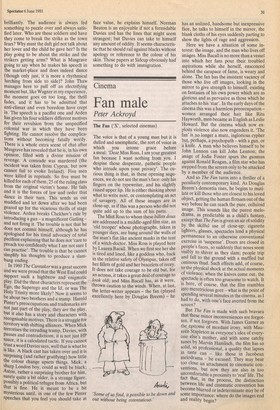Cinema
Fan male
Peter Ackroyd
The Fan ('X', selected cinemas) The voice is that of a young man but it is dulled and unemphatic, the sort of voice in which you intone grace before a meal: `Dear Miss Ross, I am your greatest fan because I want nothing from you. I despise those desperate, pathetic people who intrude upon your privacy'. The curious thing is that, in these opening sequences, we do not see the man's face: only his fingers on the typewriter, and his slightly raised upper lip. He is either thinking about what to write next, or contemplating an act of savagery. All of these images are in close-up, as if this was a person who did not quite add up to the sum of his parts. The Miss Ross to whom these billets doux are addressed is a middle-aged film star, an `old trooper' whose photographs, taken in younger days, are hung around the walls of the man's flat like ancient masks in the tent of a witch-doctor. Miss Ross is played here by Lauren Bacall. When we first see her she is tired and lined, like a goddess who, back in the relative safety of Olympus, takes off her fillets of gold and her bracelets of ivory. It does not take courage to be old but, for an actress, it takes a great deal of courage to look old; and Miss Bacall has, as it were, thrown caution to the winds. When, at last, the letter-writer appears — the fan (played excellently here by Douglas Breem) — he has an unlined, handsome but inexpressive face, he talks to himself in the mirror, the blank cloths of his eyes suddenly parting to show the lights of rage and aggression.
Here we have a situation of some interest: the image, and the man who lives off images. Miss Bacall is no more than a vessel into which her fans pour their troubled aspirations while she herself, ensconced behind the carapace of fame, is weary and alone. The fan has the insistent vacancy of those who live off images, looking in the mirror to give strength to himself, existing on fantasies of his own power which are as glorious and as pervasive as those which he attaches to his 'star'. In the early days of the cinema this was a harmless preoccupation — women arranged their hair like Rita Hayworth, men became as English as Leslie Howard. But the cinema which now exploits violence also now engenders it. The fan' is no longer a mute, inglorious cypher but, perhaps, a psychopath — with a gun, or a knife. A man who believes himself to be John Lennon can kill John Lennon; the image of Jodie Foster spurs the gunman against Ronald Reagan, a film star who has stepped from the screen only to be attacked by a member of the audience.
And so The Fan turns into a thriller of a peculiarly contemporary kind. As Douglas Breem's dementia rises, he begins to mutilate or kill those who are closest to his loved object, getting the human flotsam out of the way before he can reach the pure, celluloid image. This sounds like the purest melodrama, as predictable as a child's fantasy, except that The Fan is given an air of solidity by the skilful use of close-up: cigarette lighters, glasses, spectacles lend a physical permanence to an otherwise conventional exercise in 'suspense'. Doors are closed in people's faces, so suddenly that noses seem visibly to shiver as they slam; people trip and fall to the ground with a muffled but ominous thud. Such effects add, of course, to the physical shock at the actual moments of violence: when the knives come out, the spectacle is often too gruesome to watch. It is here, of course, that the film stumbles into meretricious gore — what is the point of spending several minutes in the cinema, as I had to do, with one's face averted from the screen?
But The Fan is made with such bravura that these minor inconveniences are forgotten, if not forgiven. With James Garner as the epitome of mordant irony, with Maureen Stapleton as everyone's idea of every one else's mother, and with some catchy tunes by Marvin Hamlisch, the film has so solid, so professional, a quality that lapses in taste can — like those in Jacobean melodrama — be excused. They may bear too dose an attachment to cinematic conventions, but now they are also in too uncomfortable a proximity to 'real' life. The fact that, in the process, the distinction between life and cinematic convention has become blurred or indeterminate may be of some importance: where do the images end and reality begin?










































 Previous page
Previous page